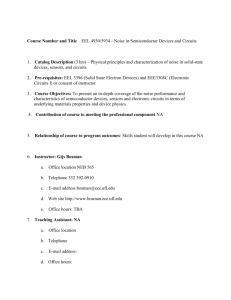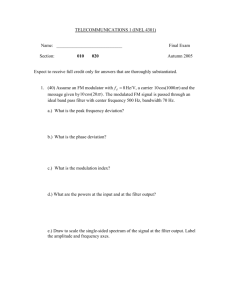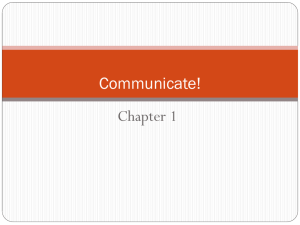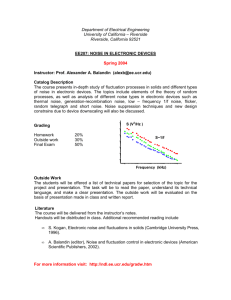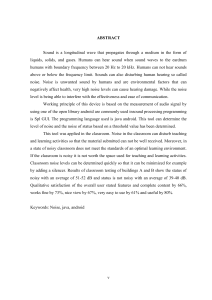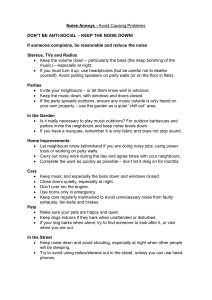Spring 2016 - Associate Chair Home
advertisement
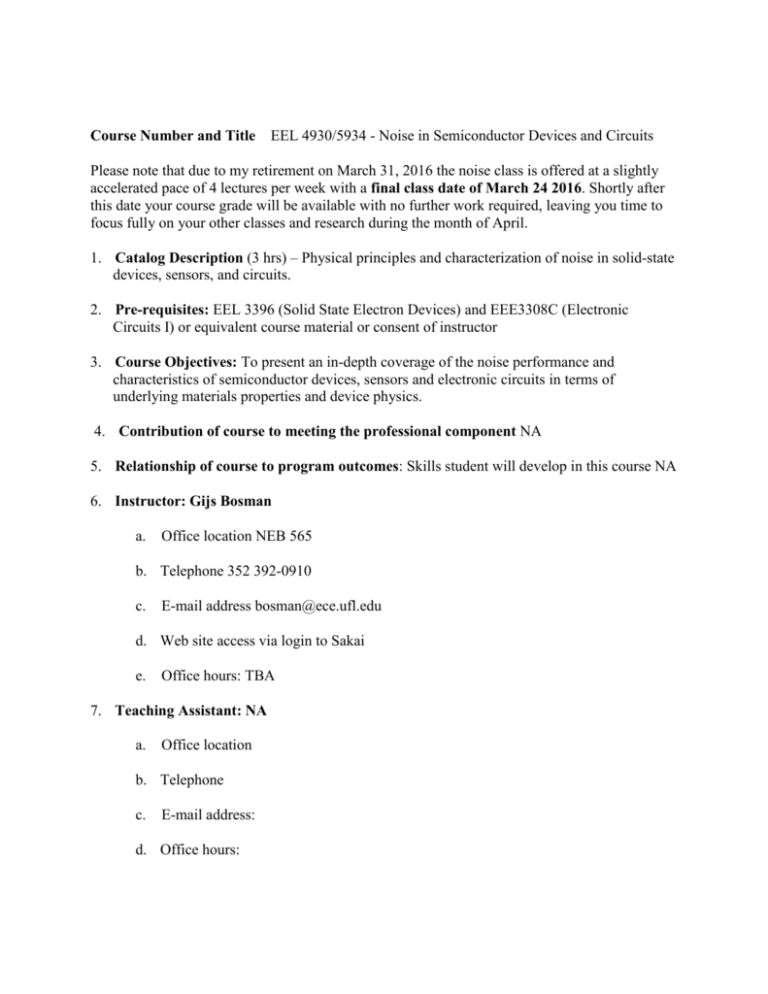
Course Number and Title EEL 4930/5934 - Noise in Semiconductor Devices and Circuits Please note that due to my retirement on March 31, 2016 the noise class is offered at a slightly accelerated pace of 4 lectures per week with a final class date of March 24 2016. Shortly after this date your course grade will be available with no further work required, leaving you time to focus fully on your other classes and research during the month of April. 1. Catalog Description (3 hrs) – Physical principles and characterization of noise in solid-state devices, sensors, and circuits. 2. Pre-requisites: EEL 3396 (Solid State Electron Devices) and EEE3308C (Electronic Circuits I) or equivalent course material or consent of instructor 3. Course Objectives: To present an in-depth coverage of the noise performance and characteristics of semiconductor devices, sensors and electronic circuits in terms of underlying materials properties and device physics. 4. Contribution of course to meeting the professional component NA 5. Relationship of course to program outcomes: Skills student will develop in this course NA 6. Instructor: Gijs Bosman a. Office location NEB 565 b. Telephone 352 392-0910 c. E-mail address bosman@ece.ufl.edu d. Web site access via login to Sakai e. Office hours: TBA 7. Teaching Assistant: NA a. Office location b. Telephone c. E-mail address: d. Office hours: 8. Meeting Times: Tuesday period 6 and 7 and Thursday periods 7 and 8. Last day of class will be March 24, 2016 instead of April 20, 2016 as for other UF classes. 9. Class/laboratory schedule, four classes per week, 50 minutes each. Last day of class will be March 24, 2016 instead of April 20, 2016 as for other UF classes. 10. Meeting Location: CSE building room E122 11. Material and Supply Fees: None 12. Textbooks and Software Required a. Textbook: None, my handwritten lecture notes will be made available on a regular basis. b. Author: - c. Publication date and edition: - d. ISBN number: 13. Recommended Reading: TBA. Course Outline: Topics: 1. Introduction to physical device noise sources 1.1 Number fluctuation noise 1.2 Velocity fluctuation noise 1.3 Noise current and voltage spectral density 1.4 Noise stemming from electron and hole traps and defects 1.5 1/f noise 2. Noise characterization and measurements 2.1 Low frequency noise measurements on two terminal devices 2.2 Low frequency noise measurements on three terminal devices 2.3 High frequency noise measurements on two terminal devices 2.4 High frequency noise measurements on three terminal devices 2.5 Optimum noise source resistance, noise figure, noise equivalent current 2.6 Friiss formula for an amplifier chain 2.7 Low noise circuit design 3. Noise of p-n junction based devices and detectors 3.1 Shot noise of a p-n diode 3.2 Noise equivalent optical power and detectivity of photodiodes 3.3 1/f noise in p-n diodes 3.4 Hooge parameter 4. Noise of MOS transistors and HEMTs 4.1 Thermal noise 4.2 Hot carrier noise 4.3 Induced gate noise 4.4 Low frequency trapping noise 4.5 Unified low frequency noise model 5. Device parameter extraction from noise data 5.1 Hot carrier diffusion constant 5.2 Trap energy levels, cross sections and densities 5.3 Electromigration 5.4 Impact ionization onset 5.5 Device aging 14. Attendance and Expectations: Attendance is expected. Questions and discussions during class and office hours are strongly encouraged. Underlying principles and gaining insight are more important than memorization. 15. Grading – Tests I and II count for 30% each, the homework for 20%, and the final for 20%. Test dates: Test I Thursday January 28 period 7, Test II Thursday February 25 period 7, and Final Exam Tuesday March 22 period 7 and 8. Homework will be assigned regularly and will count for 20% towards your final grade. One assignment may be missed. Undergraduate and graduate students will attend the same lectures, but the level and scope of the homework assigned to each group will differ. 16. Grading Scale – The UF standard grading brackets as defined in Sakai will be used This statement must be included in every grade scale for undergraduate level 1000-4000 syllabi: “A C- will not be a qualifying grade for critical tracking courses. In order to graduate, students must have an overall GPA and an upper-division GPA of 2.0 or better (C or better). Note: a Caverage is equivalent to a GPA of 1.67, and therefore, it does not satisfy this graduation requirement. For more information on grades and grading policies, please visit: https://catalog.ufl.edu/ugrad/current/regulations/info/grades.aspx 17. Make-up Exam Policy: Make up exams require documented requests in writing and are only approved for extenuating circumstances beyond a student’s control. 18. Honesty Policy – All students admitted to the University of Florida have signed a statement of academic honesty committing themselves to be honest in all academic work and understanding that failure to comply with this commitment will result in disciplinary action. This statement is a reminder to uphold your obligation as a UF student and to be honest in all work submitted and exams taken in this course and all others. 19. Accommodation for Students with Disabilities – Students Requesting classroom accommodation must first register with the Dean of Students Office. That office will provide the student with documentation that he/she must provide to the course instructor when requesting accommodation. 20. UF Counseling Services –Resources are available on-campus for students having personal problems or lacking clear career and academic goals. The resources include: UF Counseling & Wellness Center, 3190 Radio Rd, 392-1575, psychological and psychiatric services. Career Resource Center, Reitz Union, 392-1601, career and job search services. 21. Software Use – All faculty, staff and student of the University are required and expected to obey the laws and legal agreements governing software use. Failure to do so can lead to monetary damages and/or criminal penalties for the individual violator. Because such violations are also against University policies and rules, disciplinary action will be taken as appropriate. We, the members of the University of Florida community, pledge to uphold ourselves and our peers to the highest standards of honesty and integrity.
